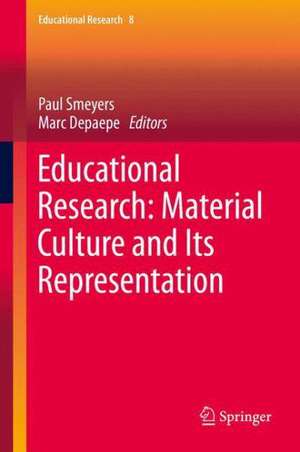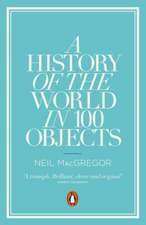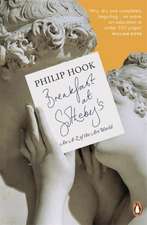Educational Research: Material Culture and Its Representation: Educational Research, cartea 8
Editat de Paul Smeyers, Marc Depaepeen Limba Engleză Hardback – 21 feb 2014
| Toate formatele și edițiile | Preț | Express |
|---|---|---|
| Paperback (6) | 635.80 lei 6-8 săpt. | |
| SPRINGER NETHERLANDS – 10 oct 2011 | 635.80 lei 6-8 săpt. | |
| SPRINGER NETHERLANDS – 14 mar 2012 | 636.12 lei 6-8 săpt. | |
| Springer International Publishing – 3 sep 2016 | 637.28 lei 6-8 săpt. | |
| SPRINGER NETHERLANDS – 20 mai 2011 | 637.46 lei 6-8 săpt. | |
| Springer International Publishing – 30 mai 2018 | 637.59 lei 6-8 săpt. | |
| Springer International Publishing – 29 dec 2018 | 641.20 lei 6-8 săpt. | |
| Hardback (6) | 641.85 lei 6-8 săpt. | |
| SPRINGER NETHERLANDS – 10 noi 2006 | 641.85 lei 6-8 săpt. | |
| SPRINGER NETHERLANDS – 27 oct 2009 | 642.18 lei 6-8 săpt. | |
| Springer International Publishing – 21 feb 2014 | 643.48 lei 6-8 săpt. | |
| SPRINGER NETHERLANDS – 8 oct 2007 | 643.65 lei 6-8 săpt. | |
| Springer International Publishing – 6 iun 2016 | 643.84 lei 6-8 săpt. | |
| Springer International Publishing – 4 apr 2018 | 647.40 lei 6-8 săpt. |
Preț: 643.48 lei
Preț vechi: 757.04 lei
-15% Nou
Puncte Express: 965
Preț estimativ în valută:
123.12€ • 128.57$ • 101.68£
123.12€ • 128.57$ • 101.68£
Carte tipărită la comandă
Livrare economică 15-29 aprilie
Preluare comenzi: 021 569.72.76
Specificații
ISBN-13: 9783319030821
ISBN-10: 3319030825
Pagini: 232
Ilustrații: XI, 219 p. 16 illus.
Dimensiuni: 155 x 235 x 18 mm
Greutate: 0.5 kg
Ediția:2014
Editura: Springer International Publishing
Colecția Springer
Seria Educational Research
Locul publicării:Cham, Switzerland
ISBN-10: 3319030825
Pagini: 232
Ilustrații: XI, 219 p. 16 illus.
Dimensiuni: 155 x 235 x 18 mm
Greutate: 0.5 kg
Ediția:2014
Editura: Springer International Publishing
Colecția Springer
Seria Educational Research
Locul publicării:Cham, Switzerland
Public țintă
ResearchCuprins
1. On the tangible material culture of child-rearing, education, and educational research.- Paul Smeyers & Marc Depaepe.- 2. Valorising the cultural heritage of the school desk through historical research; Marc Depaepe, Frank Simon & Pieter Verstraete.- 3. Mirrors of reality? Material culture and the significance of images for research into long-term educational processes; Jeroen J.H. Dekker.- 4. Visual, literary and numerical perspectives on education: materiality, presence and interpretation; Karin Priem.- 5. Education and the ‘new totalitarianism’: How standards for reporting on empirical studies of education limit the scope of academic research and communication; Sophie Ward.- 6. Materials that shape researchers; Naomi Hodgson.- 7. The Tractarian template in the representation of educational research: Can we ever depart from the picture of logical empiricism?; Paul Smeyers.- 8. The ethics of materiality: Some insights from non-representational theory for educational research; Lynn Fendler.- 9. Mud and hair: an essay on the conditions of educational research; Richard Smith.- 10. Material and aesthetic tensions within arts-based educational research: Drawing woodpaths; Maureen K. Michael & Ian Munday.- 11. Olympification versus aesthetization: The appeal of mathematics outside the classroom; Kathleen Coessens, Karen François & Jean Paul Van Bendegem.- 12. Signs of the times: Iconography of a new education; Paul Standish.- 13. The paradigmatic differences between name/date and footnote styles of citation; Nick Burbules.- 14. Conversation – in the construction and representation of research; David Bridges.- 15. About the Authors.- Author Index – Subject Index.
Textul de pe ultima copertă
This collection discusses and illustrates how educational research is affected by the economic, institutional and physical contingencies of its time, and in our time even increasingly is driven by them. It is argued that the antidote to this is, however, not to aspire to ‘thought itself’, but instead to do justice to its own rootedness in the ‘material’, including textuality. From an historical point of view such an innovative approach can itself revamp the material scholarly culture and the way it is represented.
The chapters address a variety of topics such as the cultural heritage of the school desk, the significance of images for research into long-term educational processes, the way iconic signs function, and how modes of enquiry relate to the materiality of education. Attention is also given to standards for reporting on educational research studies and how these limit the scope and communication and moreover shape researchers, to the forms of citation practices as substantially influencing methods and content, and to the centrality of conversation not just as the means to an end but as what matters; further to representational and to non-representational theories for educational research. Some examples are drawn from the area of arts-based educational research, from mathematics education, and from the discourse on universities.
In this rich and diverse collection, Paul Smeyers and Marc Depaepe have awakened educational theory and the practices of educational research to the ‘material turn’ currently stimulating fresh and innovative approaches to critical enquiry all across contemporary anthropology and the social sciences. In restoring to education a much-needed attentiveness to the object, the image, the collection, the body, the textures of the external environment, the bricolage of everyday and academic material encounters and metaphors,the essays in this volume significantly extend the repertoire of resources and methods through which we come to understand and critique the place of learning, teaching and meaning-making in our lives.
Prof Robert A. Davis, University of Glasgow, Scotland, UK
The different chapters of this book reveal the fruitful results of a community of scholars engaged in what Montaigne might have described as “playful conversation”. Philosophers and historians of education are gathered here together to envision material culture both as an object of study and as an approach. By asking the reader to think seriously about school desks, modes of citation or the challenges of studying visual images, numerical logic or artistic experiences, the volume raises a wide array of questions that should stimulate a lively interdisciplinary discussion among all those who are interested in contemporary educational research.
Prof Rebecca Rogers, Université Paris Descartes, France
This publication, as well as the ones that are mentioned in the preliminary pages of this work, were realized by the Research Community (FWO Vlaanderen / Research Foundation Flanders, Belgium) Philosophy and History of the Discipline of Education: Faces and Spaces of Educational Research.
The chapters address a variety of topics such as the cultural heritage of the school desk, the significance of images for research into long-term educational processes, the way iconic signs function, and how modes of enquiry relate to the materiality of education. Attention is also given to standards for reporting on educational research studies and how these limit the scope and communication and moreover shape researchers, to the forms of citation practices as substantially influencing methods and content, and to the centrality of conversation not just as the means to an end but as what matters; further to representational and to non-representational theories for educational research. Some examples are drawn from the area of arts-based educational research, from mathematics education, and from the discourse on universities.
In this rich and diverse collection, Paul Smeyers and Marc Depaepe have awakened educational theory and the practices of educational research to the ‘material turn’ currently stimulating fresh and innovative approaches to critical enquiry all across contemporary anthropology and the social sciences. In restoring to education a much-needed attentiveness to the object, the image, the collection, the body, the textures of the external environment, the bricolage of everyday and academic material encounters and metaphors,the essays in this volume significantly extend the repertoire of resources and methods through which we come to understand and critique the place of learning, teaching and meaning-making in our lives.
Prof Robert A. Davis, University of Glasgow, Scotland, UK
The different chapters of this book reveal the fruitful results of a community of scholars engaged in what Montaigne might have described as “playful conversation”. Philosophers and historians of education are gathered here together to envision material culture both as an object of study and as an approach. By asking the reader to think seriously about school desks, modes of citation or the challenges of studying visual images, numerical logic or artistic experiences, the volume raises a wide array of questions that should stimulate a lively interdisciplinary discussion among all those who are interested in contemporary educational research.
Prof Rebecca Rogers, Université Paris Descartes, France
This publication, as well as the ones that are mentioned in the preliminary pages of this work, were realized by the Research Community (FWO Vlaanderen / Research Foundation Flanders, Belgium) Philosophy and History of the Discipline of Education: Faces and Spaces of Educational Research.
Caracteristici
Challenges prevailing ideas about the ‘application’ of philosophy and history of education Demonstrates in a unique way how philosophical and historical approaches are relevant for the practice and theory of education and for educational research Takes the debate of the historical and philosophical complexities and constraints of the discourse of educational research in the context of material culture and its representation a step further Includes supplementary material: sn.pub/extras
Recenzii
"Freedom of inquiry in educational research can no longer be taken for granted. Narrow definitions of what constitutes ‘scientific’ research, funding criteria that enforce particular research methods, and policy decision processes that ignore any research that is not narrowly utilitarian, create a context in many countries that discourages scholarship of a more speculative, exploratory, or critical sort.
This book brings together an exceptional combination of international and cross-disciplinary scholars who bring the perspectives of history and philosophy of science to ask, ‘How did we arrive at this place? and ‘Where is educational research heading? The book illuminates the anti-intellectual consequences of a ‘what works’ mentality in education, and shows that the ostensibly ‘scientific’ revolution in educational research in fact reflects an ahistorical and conceptually muddled understanding of what actually constitutes ‘science.’ This book could not be more timely and important."
Nicholas C. Burbules, Grayce Wicall Gauthier Professor, University of Illinois
"With research increasingly tied to State policies with the instrumental purpose of guiding school reforms, the volume provides an important historical and philosophical questioning of the possibilities, limitations and challenges of education research. Internationally leading scholars engage in a significant conversation that is sophisticated and nuanced for understanding contemporary debates." Thomas S. Popkewitz, the University of Wisconsin-Madison, USA
This book brings together an exceptional combination of international and cross-disciplinary scholars who bring the perspectives of history and philosophy of science to ask, ‘How did we arrive at this place? and ‘Where is educational research heading? The book illuminates the anti-intellectual consequences of a ‘what works’ mentality in education, and shows that the ostensibly ‘scientific’ revolution in educational research in fact reflects an ahistorical and conceptually muddled understanding of what actually constitutes ‘science.’ This book could not be more timely and important."
Nicholas C. Burbules, Grayce Wicall Gauthier Professor, University of Illinois
"With research increasingly tied to State policies with the instrumental purpose of guiding school reforms, the volume provides an important historical and philosophical questioning of the possibilities, limitations and challenges of education research. Internationally leading scholars engage in a significant conversation that is sophisticated and nuanced for understanding contemporary debates." Thomas S. Popkewitz, the University of Wisconsin-Madison, USA
Notă biografică
Paul Smeyers is Professor at Ghent University and at KU Leuven, both in Belgium, and Honorary Professor at Stellenbosch University (South Africa). He teaches philosophy of education and methodology of the Geisteswissenschaften (Qualitative/Interpretative Research Methods). He is the author of numerous articles focusing on Wittgenstein’s relevance for philosophy of education, on postmodernism, and on issues of the methodology of educational research. He is President of the International Network of Philosophers of Education and link-convenor for Network 13, Philosophy of Education, European Educational Research Association. He is the Editor of Ethics and Education (Taylor and Francis). Together with Nigel Blake, Richard Smith, and Paul Standish he co-authored three books, Thinking Again, Education in an Age of Nihilism, The Therapy of Education, and with Michael Peters and Nick Burbules Showing and Doing. With Marc Depaepe he co-edited the series Educational Research (Springer, thus far 10 books). Recent publications include a co-authored book with Richard Smith (Making Sense of Education and EducationalRresearch, Cambridge University Press, Cambridge, 2014), a collection co-edited with David Bridges, Morwenna Griffiths, and Nick Burbules (International handbook of interpretation in educational research methods, 2 vols., Springer, 2015) and a collection he edited for Springer, International Handbook of Philosophy of Education (2 volumes, to be published in 2018). His latest work focuses anew on Wittgenstein’s legacy for philosophy of education. Some of that is included in the collection edited by Michael Peters and Jeff Stickney (A Companion to Wittgenstein on Education. Springer, 2017). Attention to Smeyers’ contributions in this area are discussed in the Foreword (David Bakhurst), the introductory chapter (Editors), and in a separate chapter by Paul Standish of this collection.
Marc Depaepe is Professor of History of Education and History of Psychology at the KU Leuven, campus Kulak (Flanders, Belgium). Deputy Vice-Chancellor at the KU Leuven, responsible for the campuses at Kortrijk (Kulak), Bruges and Ostend between (2013-2017). Co-editor-in-chief of Paedagogica Historica, since 2005. Former Secretary (1989-1991) and Chairman (1991-1994) of the "International Standing Conference for the History of Education" (ISCHE). Former President of the “Belgian Dutch Society for the History of Education” (BNVGOO) (1998-2002) and Vice-president of the “Internationale Gesellschaft für Historische und Systematische Schulbuchforschung” (IGHSSF) in Germany (1997-2008). Member of the Board of directors of the International Academy of Education (IAE), since 2012. Published and co-published abundantly on the history of education. His selected readings, Between Educationalization and Appropriation, were published in 2012. In 2015 he was awarded a honorary doctorate at the University of Latvia in Riga.
Marc Depaepe is Professor of History of Education and History of Psychology at the KU Leuven, campus Kulak (Flanders, Belgium). Deputy Vice-Chancellor at the KU Leuven, responsible for the campuses at Kortrijk (Kulak), Bruges and Ostend between (2013-2017). Co-editor-in-chief of Paedagogica Historica, since 2005. Former Secretary (1989-1991) and Chairman (1991-1994) of the "International Standing Conference for the History of Education" (ISCHE). Former President of the “Belgian Dutch Society for the History of Education” (BNVGOO) (1998-2002) and Vice-president of the “Internationale Gesellschaft für Historische und Systematische Schulbuchforschung” (IGHSSF) in Germany (1997-2008). Member of the Board of directors of the International Academy of Education (IAE), since 2012. Published and co-published abundantly on the history of education. His selected readings, Between Educationalization and Appropriation, were published in 2012. In 2015 he was awarded a honorary doctorate at the University of Latvia in Riga.


















